上海版牛津英语六年级上课本解析
沪教牛津版六年级英语上册全册知识点点汇总
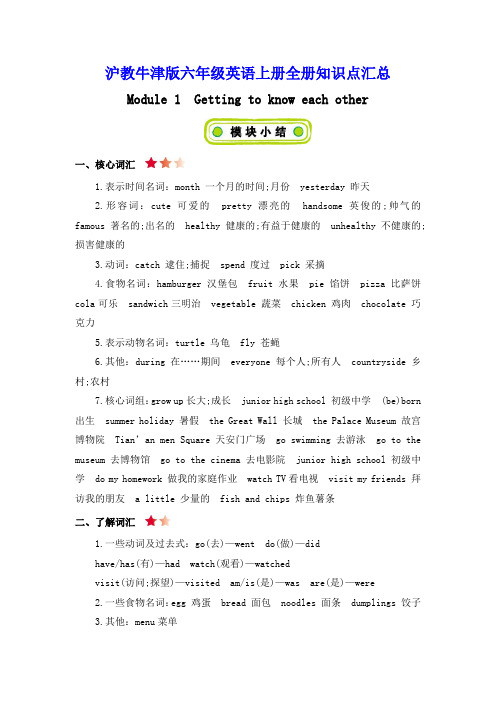
沪教牛津版六年级英语上册全册知识点汇总Module 1 Getting to know each other一、核心词汇1.表示时间名词:month 一个月的时间;月份yesterday 昨天2.形容词:cute 可爱的pretty 漂亮的handsome 英俊的;帅气的famous 著名的;出名的healthy 健康的;有益于健康的unhealthy 不健康的;损害健康的3.动词:catch 逮住;捕捉spend 度过pick 采摘4.食物名词:hamburger 汉堡包fruit 水果pie 馅饼pizza 比萨饼cola可乐sandwich三明治vegetable 蔬菜chicken 鸡肉chocolate 巧克力5.表示动物名词:turtle 乌龟fly 苍蝇6.其他:during 在……期间everyone 每个人;所有人countryside 乡村;农村7.核心词组:grow up长大;成长junior high school 初级中学(be)born 出生summer holiday 暑假the Great Wall 长城the Palace Museum 故宫博物院Tian’an men Square 天安门广场go swimming 去游泳go to the museum 去博物馆go to the cinema 去电影院junior high school 初级中学do my homework 做我的家庭作业watch TV看电视visit my friends 拜访我的朋友 a little 少量的fish and chips 炸鱼薯条二、了解词汇1.一些动词及过去式:go(去)—went do(做)—didhave/has(有)—had watch(观看)—watchedvisit(访问;探望)—visited am/is(是)—was are(是)—were2.一些食物名词:egg 鸡蛋bread 面包noodles 面条dumplings 饺子3.其他:menu菜单三、核心句型1.Her hair was short and her eyes were big. 她那时头发很短而且眼睛很大。
牛津上海版英语六年级上学期教材梳理及练习 Unit1
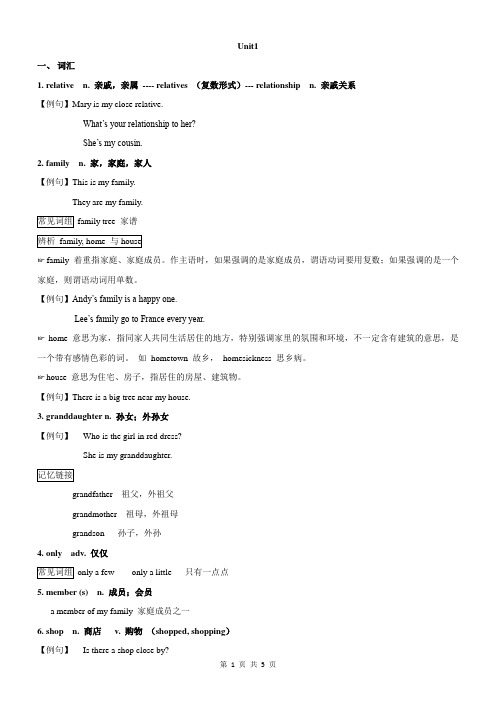
Unit1一、词汇1.relative n. 亲戚,亲属---- relatives (复数形式)--- relationship n. 亲戚关系【例句】Mary is my close relative.--- What’s your relationship to her?--- She’s my cousin.2.family n. 家,家庭,家人【例句】This is my family.They are my family.family tree 家谱☞ family 着重指家庭、家庭成员。
作主语时,如果强调的是家庭成员,谓语动词要用复数;如果强调的是一个家庭,则谓语动词用单数。
【例句】Andy’s family is a happy one.Lee’s family go to France every year.☞home 意思为家,指同家人共同生活居住的地方,特别强调家里的氛围和环境,不一定含有建筑的意思,是一个带有感情色彩的词。
如hometown 故乡,homesickness 思乡病。
☞ house 意思为住宅、房子,指居住的房屋、建筑物。
【例句】There is a big tree near my house.3. granddaughter n. 孙女;外孙女【例句】--- Who is the girl in red dress?--- She is my granddaughter.grandfather 祖父,外祖父grandmother 祖母,外祖母grandson 孙子,外孙4. only adv. 仅仅only a few only a little 只有一点点5. member (s) n. 成员;会员a member of my family 家庭成员之一6. shop n. 商店v. 购物(shopped, shopping)【例句】--- Is there a shop close by?--- Yes, there is a big shop on the right.--- I want to go shopping tomorrow.--- I’ll go with you.bookshop 书店shopping bag 购物袋shopping centre 购物中心shopping mall 大型购物商场go shopping 去购物= do some shopping 【例句】I have to go shopping this afternoon.= I have to do some shopping this afternoon. 7. else adv. 别的,其他的【例句】--- What else do you want?--- Nothing else, thank you.someone/anybody/nobody elsenothing/something/anything elsewho elsewhere elsewhat else?who else? 强调还有什么/谁...?8. badminton n. 羽毛球【例句】Tom likes playing badminton.play + 球类运动【例如】play tennis 打网球play table tennis 打乒乓球play football 踢足球play volleyball 打排球9. cycle n. 自行车v. 骑自行车【例句】They want to go there by cycle.He cycles to work every day.cycle 作名词时还有周期、循环的意思。
上海市小学六年级第一学期英语(牛津上海版)教材教案课堂单词记忆课件(例句版)Unit 6 Going to school

来源:lot源自中古英语的hlot,意为抽签用的木片。
词组:a lot of cars 很多车 a lot of sheep 一群羊
例句:They make a lot of money. She gets a lot of information.
来源:源自古英语的hwenne,意为何时。
例句:When are we leaving? When are you going home?
词组: five star hotel 五星级宾馆 stay at/in a hotel 住宾馆
例句:I’ve booked the flights and the hotel. The hotel is now open to guests.
构成: ad+vert+ise+ment=advertisement
构成:fer+ry=ferry fer-: 词根:带来 -ry: 名词后缀 “带来带去的东西”→“渡船”
词组: by ferry 乘渡船,乘渡轮
ferry terminal 渡轮码头 例句:When does the next ferry leave? You can cross the river by ferry.
来源:源自中古英语的fewe;最初源自古英语的feawa, 意为少,少的。
词组:a few minutes 几分钟 a few of people 几个人
例句:He found a few coins in the car. I only know a few Chinese characters.
提示:本演示文稿采用Microsoft office PowerPoint 2013 制作,PPT动画特效在其他软件播放可能出现失真。
牛津沪教版六年级上6A-Unit 1 知识点梳理 + 拓展阅读

6A Module 1 Family and friendsUnit 1 Family and relatives知识点梳理I. Useful words and expressions1. family与relativesfamily通常指自己的父母、兄弟姐妹等成员。
Relatives指的是除此之外与自己有血缘关系或非血缘关系的亲属。
2. 中英家庭称谓区别grandfather: 祖父,外祖父;grandmother: 祖母,外祖母;uncle: 叔父,舅舅,姨夫,姑父;aunt: 姑姑,姨母,婶婶,舅母;cousin: 堂兄弟姐妹,表兄弟姐妹;3. Alice has got a lot of presents and birthday cards from her family and relatives.a lot of 许多大量,后面加可数名词复数或不可数名词,相当于lots of。
get sth. from sb.: 从某人那里得到某物。
4. These are my uncles and this is my aunt.在介绍人物时,常用this is或these are这种句型,而不用使用he/she is, they are句型。
5. – Alice, what do you do with your aunt? – I usually go shopping with my aunt.问句中出现的第一个do是助动词,用于对实意动词的一般疑问句提问,其否定句形式是don’t。
同样作用的助动词还有does和did。
go shopping 去购物。
动词go后面跟动词时,常常接动词的-ing形式。
e.g., go swimming去游泳go cycling去骑车go fishing去钓鱼go camping去野营6. I always play football with my father.动词play后直接跟球类运动时,不需要加定冠词the。
上海牛津英语六年级 上下册全知识点梳理

上海牛津英语六年级上下册全知识点梳理-CAL-FENGHAI.-(YICAI)-Company One1上海牛津英语六年级上下册全知识点梳理频度副词always/sometimes/usually/never 是频度副词,提问应该要用How often?在句中的位置是:放在行为动词的前面,放在be动词的后面。
也可以说“行前系后”。
E.g She is always kind.她总是很善良的。
She always helps other people.她总是帮助其他人。
不能出现这样的句子:She is always helps other people.(×)一句话中不能同时出现两个动词。
并且要注意主谓保持一致,尤其注意第三人称单数不可以忽略。
how often 与 how many timeshow often 提问“频率次数+时间范围”how many times 提问“频率次数”e.g. —How often do you exercise —Twice a week.—How many times have you been there —Twice.副词表示动作特征或性状特征。
一般用来形容或修饰除了名词和代词以外的词,主要修饰形容词、动词、其他副词和句子。
He looks very happy.(修饰形容词)The old lady is walking slowly now.(修饰动词)Luckily, he got the first prize.(修饰句子)形容词后面+ly构成副词:slow—slowly slight—slightly quick—quicklycareful—carefully fierce—fiercely immediate—immediatelygentle—gentlylucky—luckilyhappy—happily 介词What else do you do with your你和你的还干什么With是个介词,后面接人称代词时,要用宾格的形式。
沪教牛津版六年级上册英语全册教案(含单元知识点总结)
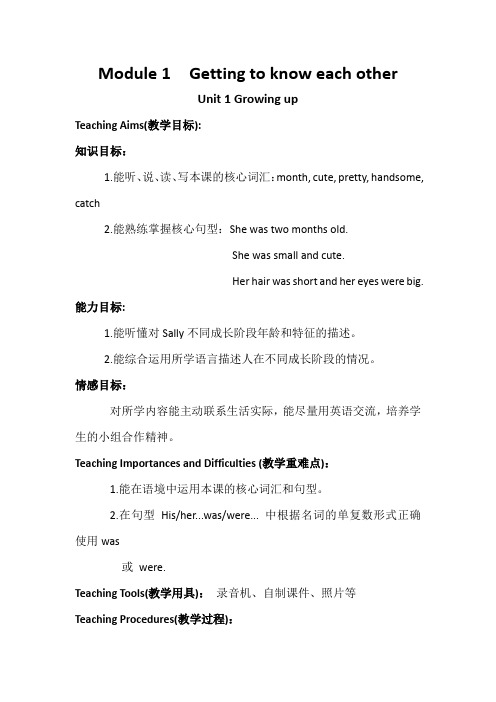
Module 1 Getting to know each otherUnit 1 Growing upTeaching Aims(教学目标):知识目标:1.能听、说、读、写本课的核心词汇:month, cute, pretty, handsome, catch2.能熟练掌握核心句型:She was two months old.She was small and cute.Her hair was short and her eyes were big.能力目标:1.能听懂对Sally不同成长阶段年龄和特征的描述。
2.能综合运用所学语言描述人在不同成长阶段的情况。
情感目标:对所学内容能主动联系生活实际,能尽量用英语交流,培养学生的小组合作精神。
Teaching Importances and Difficulties (教学重难点):1.能在语境中运用本课的核心词汇和句型。
2.在句型His/her...was/were... 中根据名词的单复数形式正确使用was或were.Teaching Tools(教学用具):录音机、自制课件、照片等Teaching Procedures(教学过程):StepⅠ.Warm up and revision(热身与复习)1. Greetings.2. Do some warming-up exercises.3. Review the numbers.Step Ⅱ.Presentation and practice(呈现新语言知识和练习)1. Lead in.T: How old are you?S1: I’m eleven years oldT: You’ll be twelve years old next year. You’re growing up.2. Show some photos and introduce the new words.3. Learn to say and use the words.4. Talk about the photos of Sally.5. Watch the screen and learn to say the sentences.6. Ask pupils to practise in groups.Sept Ⅲ. Learn the story (学习课文)1. Read the story and learn to say the useful sentences.2. Watch the cartoon.Module 1 Getting to know each otherUnit 2 My summer holidayTeaching Aims(教学目标):1.能听、说、读、写本课的核心词汇:famous, during, spend, everyone,countryside2.能熟练掌握核心句型:How was your summer holiday?It was wonderful. We went to the Great Wall.Everyone had a good time.3.读懂有关暑假生活的对话,学会询问别人和介绍自己的暑假生活。
上海版牛津英语六年级上unit1 unit2课本解析教学文案

上海版牛津英语六年级上u n i t1u n i t2课本解析1.Alice has got a lot of presents and birthday cards from her family andrelatives.(1)...have got... I think I have got one.现在完成时结构have got在口语中相当于一般现在时have的意义,表示“有”。
不过,在美国英语中常用have,而在英国英语中则常用have got。
他有一个兄弟。
He has got a brother.(英式)=He has a brother.(美式)◆现在完成时结构只有一种疑问方式,即:Have/Has...got...?◆而一般现在时结构有两种疑问方式,即:Do/Does...have...?或Have /Has...?你有一把雨伞吗?①Have you got an umbrella?②Do you have an umbrella?③Have you an umbrella?注意这两种结构疑问句的回答略有不同。
①—Have you got a dictionary?—Yes,I have./No,I haven't.②—Do you have a dictionary?—Yes,I do./No,Idon't.考点链接1.Do you have a motorbike?(同义句)→ you a motorbike?2.I don't have a mobile phone like that.→I a mobile phone like that.(2) a lot of = lots of +可数名词复数/不可数名词I have a lot of friends.= I have lots of friends.There is a lot of water in the glass . = There is lots of water in the glass.(3) 介词from2.How many uncles do you have?How many+可数名词复数+do/does+主语+have(how many在句首,名词复数跟着走)How many的用法:1)there be句型中主语的数量,如some,five,only one等提问时,如果是可数名词,不管是单是复都当复,因为说话人不知道具体的数量,而many只能接可数名词复数,所以be一定要用areHow many+可数名词复数+are there+地点或时间状语There is a book on the desk. How many books are there on the desk?There are seven days in a week. How many days are there in a week? How much的用法:1)询问事物的数量,接不可数名词How much milk isthere in the glass2)询问事物的重量 How much does the pig weigh?3)多少钱 How much is the eraser?4)询问数字计算的结果,相当于what. How much is three plus one?1. ____________ meat do you eat every week?2. ____________ students are there in your class?3.________ the pants? They’re 15 yuan.A.How many is B.How many are C.How m uch is D.How much are3.I usually go shopping with my aunt.(1) always 总是usually 通常often 经常sometimes有时候 never从不表示频率,在句中可看做是插入语。
牛津英语上海版六年级第一学期 6A Unit 4教案(4课时,含教后感)
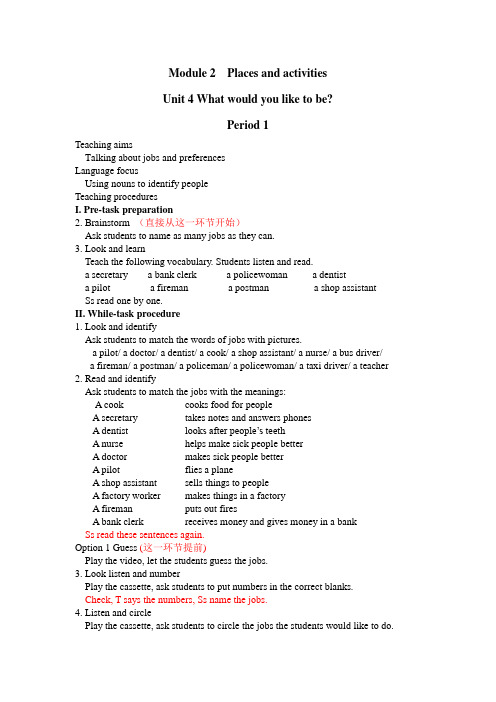
Module 2 Places and activitiesUnit 4 What would you like to be?Period 1Teaching aimsTalking about jobs and preferencesLanguage focusUsing nouns to identify peopleTeaching proceduresI. Pre-task preparation2. Brainstorm (直接从这一环节开始)Ask students to name as many jobs as they can.3. Look and learnTeach the following vocabulary. Students listen and read.a secretary a bank clerk a policewoman a dentista pilot a fireman a postman a shop assistantSs read one by one.II. While-task procedure1. Look and identifyAsk students to match the words of jobs with pictures.a pilot/ a doctor/ a dentist/ a cook/ a shop assistant/ a nurse/ a bus driver/a fireman/ a postman/ a policeman/ a policewoman/ a taxi driver/ a teacher2. Read and identifyAsk students to match the jobs with the meanings:A cook cooks food for peopleA secretary takes notes and answers phonesA dentist looks after people’s teethA nurse helps make sick people betterA doctor makes sick people betterA pilot flies a planeA shop assistant sells things to peopleA factory worker makes things in a factoryA fireman puts out firesA bank clerk receives money and gives money in a bankSs read these sentences again.Option 1 Guess (这一环节提前)Play the video, let the students guess the jobs.3. Look listen and numberPlay the cassette, ask students to put numbers in the correct blanks. Check, T says the numbers, Ss name the jobs.4. Listen and circlePlay the cassette, ask students to circle the jobs the students would like to do.(1. Read and answer 这一环节推后)Ask students to read and answer questions.Mark’s father visits Rose Garden School. He talks to Mark and his classmates...a. What job does Mark’s father do? He is a fireman.b. What does he usually do? He drives a fire-engine and puts out fires.c. Does he like his job? Yes, he does.d. Why does he like his job? Because he likes to help people and put out fires.2. Ask and answerAsk students to talk in pairs to find out their partner’s parents’ jo bs, like this:S1: What job does your father/mother do?S2: He/She is a(n) _____.S1: What does he/she usually do?S2: He/She …S1: Does he/she like his/her job?S2: Yes, he/she does./ No, he/she doesn’t.S1: Why?S2: Because he/she likes to …/Because he/she doesn’t like to…(2. Do a survey 不上)ConsolidationWorkbook 6A, page 211.Copy new words2.Read and recite the words3.Workbook P21教后记:有几个词的读音有些问题,a bank clerk、a pilot、a shop assistant,另外学生们对于有些职业做些什么工作不是很熟悉,尤其是用英语不太能表述,在下面的学习中要注意这方面的提点。
上海版牛津英语六年级(上册)单词表和课文翻译演示教学

六年级上册英语单词Module 1 Unit 1 亲戚;家属 relative家谱 family tree堂(表)兄(弟)cousin孙女;外孙女 granddaughter孙子;外孙 grandson仅仅;只 only成员 member通常 usually去购物 go shopping别的;其他的else有时 sometimes羽毛球 badminton打羽毛球 play badminton总是 always做游戏 play games骑自行车 cycle去骑自行车 go cyclingUnit 2与...讲话;与...谈话talk to一点也(不);完全(不)(not) at all 几乎almost从不 never共同,一起 together分享,分担 share互相 each other其他的 other友好的 friendly肯帮忙的 helpful...迟到 (be) late for生气 get angry宽容的 kind对...友好 (be) kind to说谎 tell lies淘气的 naughty努力地 hard美国 the USA第一次 for the first time尚;还;仍然 yet刚刚 just已经 already Unit 3度过 spend颐和园 the Summer Palace故宫博物院 the Palace Museum 天安门广场 Tiananmen Square 长城 the Great Wall天坛 the Temple of Heaven 周末 weekend离...远 far away from照片 photograph活动 activity购物 shop计划 plan地方 place主意 idea将要 shall回来come back花费 cost旅行 trip上午a.m.下午 p.m.Module 2 Unit 1秘书 secretary银行 bank职员 clerk女警察policewoman牙医 dentist愿意;想要 would like(to)因为 because使得 make安全的 safe司机 driver采访 interview工作;职业 job生病的 sick更好的 better开始;着手 start工作 work结束 finish年龄 ageUnit 2开放日 Open Day活动安排 programme父亲(或母亲) parent将要 will到达 arrive迎接 meet入口处 entrance紧接着;随后 next课题 project美术手工课 Arts and Crafts 然后 then合唱队 choir在那以后 after that俱乐部 club布告栏 noticeboard最后 finally健身房;体育馆 gym底楼,一楼 ground floorUnit 3需要... 时间 take大约 about分钟 minute小时 hour步行 on foot多长(时间) how long到达 get to邮局 post office市场 market电影院 cinema餐馆,饭店 restaurant几个 a few许多 a lot of当...时候 whenUnit 4必须 must保持安静 keep quiet从一边到另一边 across跑过马路 run across the road 等 wait等候,等待 wait for左边 left往左转 turn left进入 enter大声地 loudlyModule 3 Unit 1 主餐(通常指晚饭)dinner (在)今晚 tonight海鲜 seafood清蒸虾 steamed prawns大蒜 garlic也 also汤 soup种类 kind番茄,西红柿 tomato最喜欢的 favourite炒鸡蛋 fried eggs咸肉,熏肉 bacon菜单 menu色拉 salad翅膀 wing肉 meat水煮蛋 boiled eggsbuy的过去式及过去分词 bought 任何的,任一的 any冷冻的 frozen部门 section饺子 dumplingUnit 2有趣的事 fun可乐 cola辛辣的 spicy坚果 nut在明天,明天 tomorrow表示提出或征求意见 shall不含酒精的饮料 soft drinks 小吃 snack美味的 delicious美味的 tasty咸的 salty苦的bitter(礼貌的提问)可以,能 mayUnit 3健康的 healthy吃;饮食 eating少量;一些 a little(食用的)动植物油 fat酸奶 yogurt大量;充足 plenty大量的;充足的 plenty of新鲜的 fresh炸薯条 chips匹萨饼 pizza粥,麦片粥 porridge早餐 breakfast(日常)饮食 diet比 than较少,更少 less像...一样 as...as在昨天 yesterday不健康的 unhealthy六年级上册英语单词单词默写Module 1 Unit 1亲戚;家属家谱堂(表)兄(弟)孙女;外孙女孙子;外孙仅仅;只成员通常去购物别的;其他的有时羽毛球打羽毛球总是做游戏骑自行车去骑自行车Unit 2与...讲话;与...谈话一点也(不);完全(不)几乎从不共同,一起分享,分担互相其他的友好的肯帮忙的...迟到生气宽容的对...友好说谎淘气的努力地美国第一次尚;还;仍然刚刚已经Unit 3度过颐和园故宫博物院天安门广场长城天坛周末离...远照片活动购物计划地方主意将要回来花费旅行上午下午Module 2 Unit 1 秘书银行职员女警察牙医愿意;想要因为使得安全的司机采访工作;职业生病的更好的开始;着手工作结束年龄Unit 2开放日活动安排父亲(或母亲)将要到达迎接入口处紧接着;随后课题美术手工课然后合唱队在那以后俱乐部布告栏最后健身房;体育馆底楼,一楼Unit 3需要... 时间大约分钟小时步行多长(时间)到达邮局市场电影院餐馆,饭店几个许多当...时候Unit 4必须保持安静从一边到另一边跑过马路等等候,等待左边往左转进入大声地Module 3 Unit 1主餐(通常指晚饭)(在)今晚海鲜清蒸虾大蒜也汤种类番茄,西红柿最喜欢的炒鸡蛋咸肉,熏肉菜单色拉翅膀肉水煮蛋buy的过去式及过去分词任何的,任一的冷冻的部门饺子Unit 2有趣的事可乐辛辣的坚果在明天,明天表示提出或征求意见不含酒精的饮料小吃美味的美味的咸的苦的(礼貌的提问)可以,能Unit 3健康的吃;饮食少量;一些(食用的)动植物油酸奶大量;充足大量的;充足的新鲜的炸薯条匹萨饼粥,麦片粥早餐(日常)饮食比较少,更少像...一样在昨天不健康的六年级上册英语单词中文默写Module 1 Unit 1relativefamily treecousingranddaughtergrandsononlymemberusuallygo shoppingelsesometimesbadmintonplay badmintonalwaysplay gamescyclego cyclingUnit 2talk to(not) at allalmostnevertogethershare each otherotherfriendlyhelpful(be) late forget angrykind(be) kind totell liesnaughtyhardthe USAfor the first time yetjustalreadyUnit 3spendthe Summer Palacethe Palace Museum Tiananmen Squarethe Great Wallthe Temple of Heaven weekendfar away from photographactivityshopplanplaceideashallcome backcosttripa.m.p.m.Module 2 Unit 1 secretarybankclerkpolicewomandentistwould like(to)becausemakesafedriverinterviewjobsickbetterstartworkfinishageUnit 2Open Day programme parentwillarrivemeetentrancenextprojectArts and Crafts thenchoirafter thatclub noticeboard finallygymground floorUnit 3takeaboutminutehouron foothow longget toplst office marketcinema restauranta few a lot ofwhenUnit 4mustkeep quietacrossrun across the road waitwait forleftturn leftenterloudlyModule 3 Unit 1 dinnertonightseafoodsteamed prawns garlicalsosoupkindtomatofavouritefried eggsbaconmenusaladwingmeatboiled eggsboughtanyfrozensectiondumplingUnit 2funcolaspicynuttomorrowshallsoft drinks snack delicious tastysaltybittermayUnit 3 healthy eatinga littlefatyogurtplentyplenty offreshchipspizzaporridgebreakfastdietthanlessas...asyesterdayunhealthyModule Family and relatives Unit1 My family tree我是艾丽丝。
上海版牛津英语六年级上课本解析

1.Alice has got a lot of presents and birthday cards from her family and relatives.(1)...havegot...IthinkIhavegotone.现在完成时结构havegot在口语中相当于一般现在时have的意义,表示“有”。
不过,在美国英语中常用have,而在英国英语中则常用havegot。
他有一个兄弟。
Hehasgotabrother.(英式)=Hehasabrother.(美式)◆现在完成时结构只有一种疑问方式,即:Have/Has...got...◆◆而一般现在时结构有两种疑问方式,即:Do/Does...have...或Have/Has...你有一把雨伞吗①Haveyougotanumbrella②Doyouhaveanumbrella③Haveyouanumbrella注意这两种结构疑问句的回答略有不同。
①—H aveyougotadictionary—Yes,Ihave./No,Ihaven't.②—Doyouhaveadictionary—Yes,Ido./No,Idon't.考点链接1.Doyouhaveamotorbike(同义句)→you amotorbike2.Idon'thaveamobilephonelikethat.→I amobilephonelikethat.(2) a lot of = lots of +可数名词复数/不可数名词I have a lot of friends.= I have lots of friends.There is a lot of water in the glass . = There is lots of water in the glass.(3) 介词frommany uncles do you haveHow many+可数名词复数+do/does+主语+have(how many在句首,名词复数跟着走)How many的用法:1)there be句型中主语的数量,如some,five,only one等提问时,如果是可数名词,不管是单是复都当复,因为说话人不知道具体的数量,而many只能接可数名词复数,所以be一定要用areHow many+可数名词复数+are there+地点或时间状语There is a book on the desk. How many books are there on the deskThere are seven days in a week. How many days are there in a weekHow much的用法:1)询问事物的数量,接不可数名词How much milk is there in the glass2)询问事物的重量How much does the pig weigh3)多少钱How much is the eraser4)询问数字计算的结果,相当于what. How much is three plus one1. ____________meat do you eat every week2. ____________ students are there in your class’re15yuan.A.HowmanyisB.HowmanyareC.HowmuchisD.Howmuchare usually go shopping with my aunt.(1) always 总是usually 通常often 经常sometimes有时候never从不表示频率,在句中可看做是插入语。
上海6年级上册英语牛津n版教材
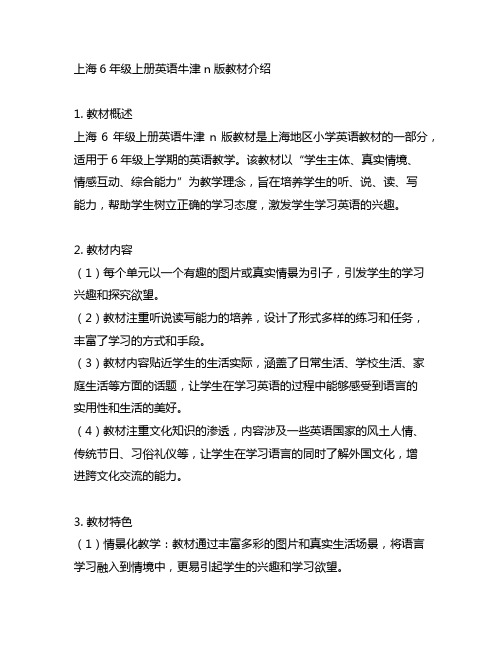
上海6年级上册英语牛津n版教材介绍1. 教材概述上海6年级上册英语牛津n版教材是上海地区小学英语教材的一部分,适用于6年级上学期的英语教学。
该教材以“学生主体、真实情境、情感互动、综合能力”为教学理念,旨在培养学生的听、说、读、写能力,帮助学生树立正确的学习态度,激发学生学习英语的兴趣。
2. 教材内容(1)每个单元以一个有趣的图片或真实情景为引子,引发学生的学习兴趣和探究欲望。
(2)教材注重听说读写能力的培养,设计了形式多样的练习和任务,丰富了学习的方式和手段。
(3)教材内容贴近学生的生活实际,涵盖了日常生活、学校生活、家庭生活等方面的话题,让学生在学习英语的过程中能够感受到语言的实用性和生活的美好。
(4)教材注重文化知识的渗透,内容涉及一些英语国家的风土人情、传统节日、习俗礼仪等,让学生在学习语言的同时了解外国文化,增进跨文化交流的能力。
3. 教材特色(1)情景化教学:教材通过丰富多彩的图片和真实生活场景,将语言学习融入到情境中,更易引起学生的兴趣和学习欲望。
(2)任务型教学:教材设计了丰富多彩的任务,如角色扮演、小组讨论、实地调查等,让学生在完成任务的过程中巩固知识,提高语言运用能力。
(3)多感官体验:教材注重培养学生的听说读写能力,通过听力、口语、阅读、写作等多种方式,帮助学生全面提高英语综合能力。
4. 教材评价上海6年级上册英语牛津n版教材以其科学规范的编排、丰富多彩的教学内容和贴近学生生活的情境化教学备受教师和学生的喜爱。
教材内容生动有趣,贴近学生生活,符合学生的认知水平和学习需求,能够激发学生对英语学习的兴趣,提高学生的学习积极性。
教材形式多样,任务设计合理,能够培养学生的综合运用能力,符合现代教育教学的发展趋势。
上海6年级上册英语牛津n版教材在内容设计和教学理念上都体现了现代教育的先进理念,是当今英语教学中一部内容丰富、形式多样的优秀教材。
希望教师们能够善加利用,结合实际教学情况,灵活运用教材,激发学生的学习热情,提高学生的英语综合能力。
沪教版牛津上海六年级上册英语阅读理解含答案解析
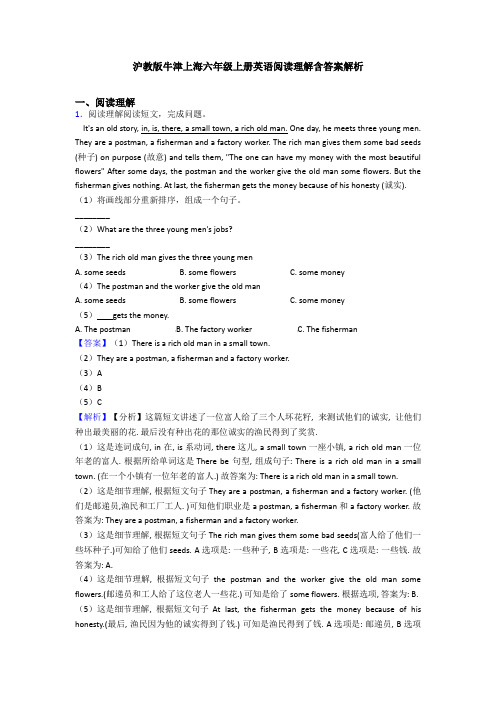
沪教版牛津上海六年级上册英语阅读理解含答案解析一、阅读理解1.阅读理解阅读短文,完成问题。
It's an old story, in, is, there, a small town, a rich old man. One day, he meets three young men. They are a postman, a fisherman and a factory worker. The rich man gives them some bad seeds (种子) on purpose (故意) and tells them, "The one can have my money with the most beautiful flowers" After some days, the postman and the worker give the old man some flowers. But the fisherman gives nothing. At last, the fisherman gets the money because of his honesty (诚实). (1)将画线部分重新排序,组成一个句子。
________(2)What are the three young men's jobs?________(3)The rich old man gives the three young menA. some seedsB. some flowersC. some money(4)The postman and the worker give the old manA. some seedsB. some flowersC. some money(5) gets the money.A. The postmanB. The factory workerC. The fisherman【答案】(1)There is a rich old man in a small town.(2)They are a postman, a fisherman and a factory worker.(3)A(4)B(5)C【解析】【分析】这篇短文讲述了一位富人给了三个人坏花籽, 来测试他们的诚实, 让他们种出最美丽的花. 最后没有种出花的那位诚实的渔民得到了奖赏.(1)这是连词成句, in 在, is系动词, there这儿, a small town一座小镇, a rich old man一位年老的富人. 根据所给单词这是There be 句型, 组成句子: There is a rich old man in a small town. (在一个小镇有一位年老的富人.) 故答案为: There is a rich old man in a small town. (2)这是细节理解, 根据短文句子They are a postman, a fisherman and a factory worker. (他们是邮递员,渔民和工厂工人. )可知他们职业是a postman, a fisherman 和a factory worker. 故答案为: They are a postman, a fisherman and a factory worker.(3)这是细节理解, 根据短文句子The rich man gives them some bad seeds(富人给了他们一些坏种子.)可知给了他们seeds. A选项是: 一些种子, B选项是: 一些花, C选项是: 一些钱. 故答案为: A.(4)这是细节理解, 根据短文句子the postman and the worker give the old man some flowers.(邮递员和工人给了这位老人一些花.) 可知是给了some flowers. 根据选项, 答案为: B.(5)这是细节理解, 根据短文句子At last, the fisherman gets the money because of his honesty.(最后, 渔民因为他的诚实得到了钱.) 可知是渔民得到了钱. A选项是: 邮递员, B选项是: 工厂工人, C选项是: 渔民., 答案为: C.【点评】这是考查阅读能力的题目. 对于任务型阅读, 首先要掌握问题要求做什么, 然后根据问题找到答案.2.阅读理解根据短文内容判断下列句子正误。
上海牛津版六年级英语上册Unit1知识点详解归纳
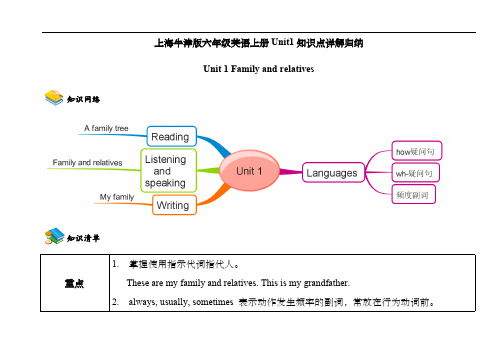
sister n.姐,妹
brother n.兄,弟
cousin n.堂/表兄弟姐妹
区别 relative 和 family
区别含义:在英语国家中,family 通常指自己的父母、兄弟姐妹等成员;而 relative 指的是除此之外 与自己有血缘关系或非血缘关系的亲属。
区别用法:family 既可以用来指家庭,也可以指家庭成员。表示家庭时,它是单数名词;表示家庭成
How many cousins do you have? 你有几个表(堂)兄弟(姐妹)?
也可以用如下方式表示相同的含义:
They haven’t any children. 他们没有孩子。
Has Ann a son? 安有儿子吗?
How many cousins have you got? 你有几个表(堂)兄弟(姐妹)?
知识网络
上海牛津版六年级英语上册 Unit1 知识点详解归纳 Unit 1 Family and rel。 These are my family and relatives. This is my grandfather.
2. always, usually, sometimes 表示动作发生频率的副词,常放在行为动词前。
【答案】seven/7, grandfather, grandmother, father, mother, sister, brother, (pet) dog
例 2.(★★)Alice _______ the first to come and the last to leave.
A.always is
【答案】C
【句型语法篇】
例 5.(★★★)Most of the girls like_________at the supermarket.
上海牛津版六年级英语上册Unit1知识点详解归纳

【解析】What else 意为“还有什么”。句意为“你还有什么想要说的?”
【答案】B
例 4.(★★)This is a phone ______ my classmate and me.
A. for
B. in
C. of
D. at
【考点】介词
【解析】句意为“这是我和同班同学的照片。”无生命物质的所属关系可用 of 介词表达。
牛津词汇 relative family tree granddaughter grandson only member *classmate
n.亲戚;亲属 家谱 n.孙女;外孙女 n.孙子;外孙 adv.仅仅 n.成员;会员 n.同班同学
shop go shopping else *badminton cycle go cycling
知识网络
上海牛津版六年级英语上册 Unit1 知识点详解归纳 Unit 1 Family and relatives
知识清单
重点
1. 掌握使用指示代词指代人。 These are my family and relatives. This is my grandfather.
2. always, usually, sometimes 表示动作发生频率的副词,常放在行为动词前。
This picture 这幅图片 = this picture here These flowers 这些花 = these flowers here
3. - How many uncles do you have? 你有几个叔叔? - I have one uncle. 我有一个叔叔。
【比较】have,has 在表示“有”时的用法:
【答案】C
牛津沪教版英语六上Unit1-Unit12全册课件-附教案

欢
迎
下
载
同步习题
提示:双击打开后可根据需要进行编辑,打印,保存。
欢
迎
下
载
Unit 1 Growing up
Look at the picture
Look and say
Sally was a baby. She was about two months old. She was small and cute.
She is 14 years old now. She goes to junior high school. She is tall and pretty. Her hair is long.
She was 8 years old. Her hair was long. She was very pretty.
One who fails to reach the Great Wall is not a true man. 不到长城非好汉。
museum
palaces
the Palace Museum
The Palace Museum is the head of the world’s top five palaces. It took 14 years to build. It is very big. It measures 961 meters from north to south and 753 meters from east to west. It has four gates and three famous halls. It is the home of many treasures.
Where did you go? What did you do? How was your summer holiday?
六年级上册 Unit4 What would you like to be 牛津上海版(含答案及解析)
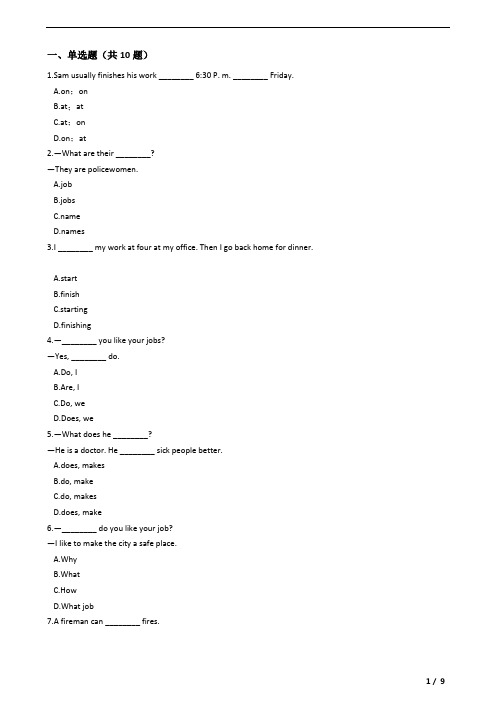
一、单选题(共10题)1.Sam usually finishes his work ________ 6:30 P. m. ________ Friday.A.on;onB.at;atC.at;onD.on;at2.—What are their ________?—They are policewomen.A.jobB.jobss3.I ________ my work at four at my office. Then I go back home for dinner.A.startB.finishC.startingD.finishing4.—________ you like your jobs?—Yes, ________ do.A.Do, IB.Are, IC.Do, weD.Does, we5.—What does he ________?—He is a doctor. He ________ sick people better.A.does, makesB.do, makeC.do, makesD.does, make6.—________ do you like your job?—I like to make the city a safe place.A.WhyB.WhatC.HowD.What job7.A fireman can ________ fires.A.put onB.put outC.put upD.put down8.Old George is a ________. He catches many fish every day.A.fishermanB.doctorC.policemanD.teacher9.I am a bank clerk. I work at the ________.A.the hospitalB.bankC.schoolD.the office10.—Can you cook dinner ________ me?—I am afraid not.A.forB.byC.toD.on二、阅读理解(共1题)11.阅读短文,选择正确的选项。
牛津沪教版英语六年级上册Unit1-Unit12全册课件-附教案

Discussion
上海教育出版社 六年级| 上册
What have we learned in this class?
上海教育出版社 六年级| 上册
Summary
Show time. Some language points. 1. on one’s mind.
2. be worried about(doing).
3. Growing up is hard.
上海教育出版社 六年级| 上册
Summary
Show time. Some language points. 4. You have been happy since I first met you.
5. wake sb up.
6. learn that way.
Teaching aims
上海教育出版社 六年级| 上册
1. To revise vocabulary and expressions to describe "Our neighbours". 2. To guess meaning from context. 3. The students are able to use the key words correctly.
What comes into your mind when talking about “growing up”?
上海教育出版社 六年级| 上册
Presentation
Learn T: Do you feel happy to grow up?
Do you want to grow up?
上海教育出版社 六年级| 上册
上海教育出版社 六年级| 上册
Part B
沪教牛津版六年级上册英语全册教学课件(2021年秋修订)

Later, Little Justin has four legs. He is green. He meets a turtle.
Justin : Are you my mum? Turtle: No, I’m not your mum. Your mum has a big mouth. She can catch flies.
Alice: It was wonderful. I went to Beijing and visited my uncle. We went to the Great Wall, Tian’anmen Square and the Palace Museum. We also went to some famous parks in Beijing, and I took a lot of photos.
I was about seventeen years old. I was a high school student. I was tall. I had short hair.
New words
× ×年 × 月
日一二三四五六
1
2
3
4
5
6
7
8
9
10 11 12
13
14
15
16
17
18
19
20
She is …
√ green
She has …
√ four legs
a long tail
√ a big mouth
black
no legs
√ no tail
a round head
- 1、下载文档前请自行甄别文档内容的完整性,平台不提供额外的编辑、内容补充、找答案等附加服务。
- 2、"仅部分预览"的文档,不可在线预览部分如存在完整性等问题,可反馈申请退款(可完整预览的文档不适用该条件!)。
- 3、如文档侵犯您的权益,请联系客服反馈,我们会尽快为您处理(人工客服工作时间:9:00-18:30)。
1.Alice has got a lot of presents and birthday cards from her family and relatives.(1)...have?got...IthinkIhavegotone.现在完成时结构have?got在口语中相当于一般现在时have的意义,表示“有”。
不过,在美国英语中常用have,而在英国英语中则常用have?got。
他有一个兄弟。
Hehasgotabrother.(英式)=Hehasabrother.(美式)◆现在完成时结构只有一种疑问方式,即:Have/Has...got...◆◆而一般现在时结构有两种疑问方式,即:Do/Does...have...◆或Have?/Has...◆你有一把雨伞吗?①Haveyougotanumbrella②Doyouhaveanumbrella③Haveyouanumbrella注意这两种结构疑问句的回答略有不同。
①—Haveyougotadictionary—Yes,I?have./No,I?haven't.②—Doyouhaveadictionary—Yes,I?do./No,Idon't.考点链接1.Doyouhaveamotorbike(同义句)→ you amotorbike2.Idon'thaveamobilephonelikethat.→I amobilephonelikethat.(2) a lot of = lots of +可数名词复数/不可数名词I have a lot of friends.= I have lots of friends.There is a lot of water in the glass . = There is lots of water in the glass.(3) 介词from2.How many uncles do you haveHow many+可数名词复数+do/does+主语+have(how many在句首,名词复数跟着走)How many的用法:1)there be句型中主语的数量,如some,five,only one等提问时,如果是可数名词,不管是单是复都当复,因为说话人不知道具体的数量,而many只能接可数名词复数,所以be一定要用areHow many+可数名词复数+are there+地点或时间状语There is a book on the desk. How many books are there on the deskThere are seven days in a week. How many days are there in a weekHow much的用法:1)询问事物的数量,接不可数名词How much milk is there in the glass2)询问事物的重量 How much does the pig weigh3)多少钱 How much is the eraser4)询问数字计算的结果,相当于what. How much is three plus one1. ____________meat do you eat every week2. ____________ students are there in your class3.________thepantsThey’re15yuan.A.HowmanyisB.HowmanyareC.HowmuchisD.Howmuchare3.I usually go shopping with my aunt.(1) always 总是usually 通常often 经常sometimes有时候 never从不表示频率,在句中可看做是插入语。
Eg: He always does his homework carefully.I often go to my grandmother’s house in the weekends.(2) go + V-ing 去做某事go shopping 去购物go cycling 去骑车Go swimming 去游泳(3) with sb 和某人一起。
with后接人称代词时,用宾格形式with用法归纳➢“用……”表示使用工具,手段等。
例如:①We can walk with our legs and feet. 我们用腿脚行走。
②He writes with a pencil. 他用铅笔写。
➢“和……在一起”,表示伴随。
例如:①Can you go to the park with me 你能和我一起去公园吗?②He often goes to the library with Jenny. 他常和詹妮一起去图书馆。
③She liveswithher son. 她和儿子住在一起。
➢“与……”。
例如:I’d like to have a talk with you. 我很想和你说句话。
➢“关于,对于”,表示一种关系或适应范围。
例如:What’s wrong with your watch 你的手表怎么了?➢“带有,具有”。
例如:①He’s a tall kid with short hair. 他是个长着一头短发的高个子小孩。
②They have no money with them. 他们没带钱。
➢“在……方面”。
例如:Kate helps me with my English. 凯特帮我学英语。
4.—— Have you been to Ocean Park yet——Yes, I have already/just been to…/been there.No, I haven’t been to…/been there yet.already,just多用于肯定句中,ever,yet,never多用于疑问句和否定句中。
➢.already意思是“已经”➢①通常用于陈述句中(放在have和has的后面)②也可用于疑问句,表示期望得到肯定的回答或表示惊异,此时already常在句末。
Shehasalreadyfoundherbike.Hasshefoundherbikealready她已经找到自行车了?➢yet用法➢①yet可用于否定句,此时译为“还”;Ihaven’tfoundmyruleryet.②也可以用于疑问句,译为“已经”(放在have和has的后面也可放在句末)Haveyoufoundyourruleryet你已经找到尺子了吗➢just只用于陈述句意思是“刚才”(放在have和has的后面)➢Ihavejustreceivedaletter.➢never用于否定句译为“从不”(放在have和has的后面)I’veneverbeentoBeijing.➢ever用于疑问句译曾经”(放在have,has的后面)HaveyoueverbeentoBeijing 练习:根据汉语提示用适当词的合适形式填空。
1.Ihave__________finishedmyhomework.我已经做完家庭作业了。
2.He______________hadhismeal.他刚吃过饭。
3._________you ________sungthisEnglishsong你曾唱过这首英文歌吗4.They__________started_________.他们还没有动身。
5.We____________heardofit.我们从来没有听说过这件事。
6.Theplane______________arrived.飞机已经来了。
7.I______________beentothepostoffice.我刚才去邮局了。
8.Mary_______________beentotheGreatWall.玛丽从未去过长城。
have been to 来过,去过(人已经回来了)have gone to 去或到某地了(人还没回来)注意:遇到四个地点副词时,去掉to (here, there, home, abroad)练习:用have been to,have gone to 填空1)Where is Jim He ______________ to Beijing.2) She has ________ to the park.She will be back in two hours.3) I have ________ to the West Lake. Look, I have taken many photos on it.4) The Whites have _______ to the USA.They won’t come back.5) I have ______ to Hong Kong twice.6) Tom has ______ to the WC, so I have to wait for him.7) How many times have you _______ to Shanghai.8) I like the Great Wall, so I have ______ there many times this month.9) Sally isn’t at home, she has ________ to Japan.10) The Blacks aren’t in Shanghai. They have ________ to Beijing together.短语:1. go shopping with my aunt 和我的阿姨去购物2.help each other 互相帮助3. be friendly to sb.对某人友好= be kind to sb4. be late for 迟到5. get angry 生气6.share her food with me 和我一起分享她的食物7.live in 住在8.ask sb about sth 询问某人关于某事ask sb to do sth 让某人做某事 ask sb not to do sth 让某人不要做某事tell sb to do sth 告诉某人做某事 tell sb not to do sth 告诉某人不要做某事promise to do sth 承诺做某事 promise not to do sth 承诺不做某事9.What about (= how about)怎么样 (加 doing)10.talk about 谈论 talk with sb 和某人谈话,talk to sb.和某人谈话11. keep the environment clean 保持环境干净12.look after 照顾(= take care of )13.discuss it with your classmates 和你的同学讨论。
